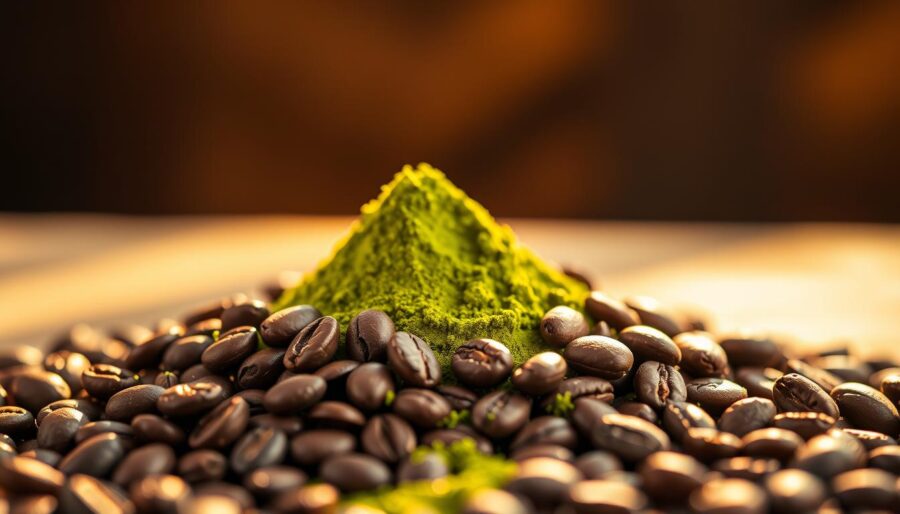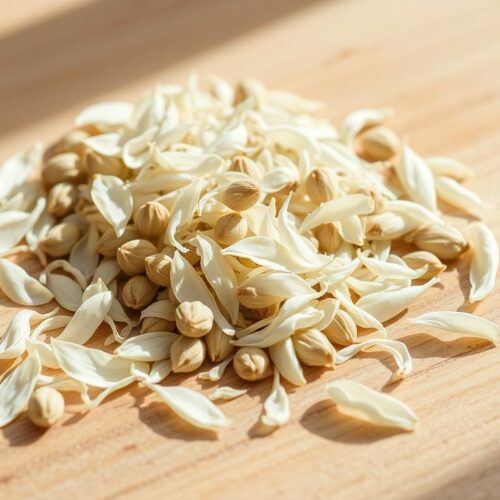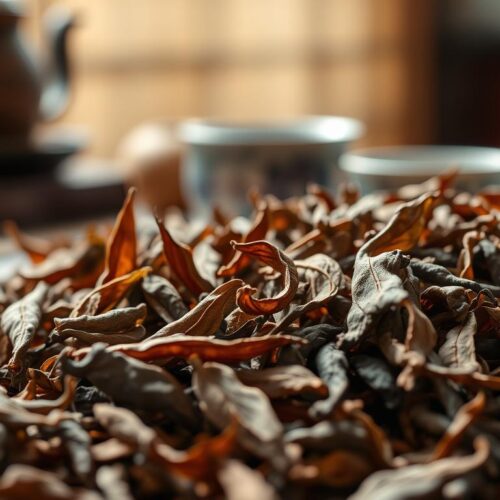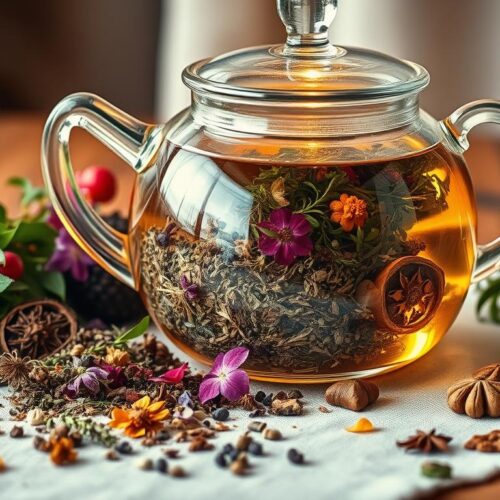Welcome to the intense matcha vs coffee debate, focusing on energy and health. Matcha is a beloved drink made from fine green tea leaves. It’s known for its special health perks. On the other hand, coffee is a worldwide favorite that’s part of many cultures. This article will delve into what makes these drinks alike and different. It will help you choose the best drink to boost your energy.
Understanding Matcha and Coffee: An Overview
Matcha comes from shade-grown green tea leaves ground into a fine powder. Drinking matcha means you get the whole leaf. This gives you lots of nutrients. Its bright green color and strong flavor make matcha a favorite for those who love their health. Matcha isn’t just yummy; it’s full of antioxidants, vitamins, and minerals for your health.
Coffee has a story that begins in Ethiopia and spans centuries. It’s loved worldwide today. Coffee perks you up, makes you feel better, and might help your metabolism. People enjoy coffee in many ways, making it a global favorite.
Matcha and coffee come from rich traditions. Matcha is part of Japanese ceremonies, promoting mindfulness. Coffee brings people together in cafes worldwide. Knowing how they are made and their benefits shows why they are key to modern diets.
Nutritional Profiles: A Comparative Analysis
When we look into matcha and coffee, we see they have different healthy substances. Matcha is full of antioxidants, especially catechins, which may help prevent cancer and boost metabolism. It also has vitamins A, C, and E, plus fiber, which are great for health.
Coffee, meanwhile, has its unique perks. It offers chlorogenic acids, good for the heart and blood sugar levels. Also, it’s a source of B vitamins, magnesium, and potassium, helping meet daily nutrition needs. Plus, its antioxidants, like phenolic compounds, support overall health.
Below is a detailed comparison of the key nutrients found in both beverages:
| Nutrient | Matcha (per 1g) | Coffee (per 1g) |
|---|---|---|
| Calories | 3 | 2 |
| Antioxidants | High (Catechins) | High (Chlorogenic Acids) |
| Fiber | 0.7g | 0g |
| Vitamin C | 10% DV | 0% DV |
| B Vitamins | Variable | Various (B2, B3, B5) |
Both matcha and coffee have special nutritional benefits. Choosing matcha for its antioxidants or coffee for its energy can be smart. Knowing their nutrients lets you pick the right drink for you.
Caffeine Content Explained: Matcha vs. Coffee
Caffeine is vital when we talk about energy from drinks like matcha and coffee. A normal cup of coffee has about 95-200 mg of caffeine. This depends on how it’s made. Matcha has about 70 mg per serving. This causes different effects for those who drink them.
The way caffeine from these drinks enters your body is also different. Coffee gives you a fast energy burst. This can make you feel awake but sometimes jittery. Matcha’s caffeine, paired with L-theanine, gives you calm and focus. This mix means caffeine goes into your system more smoothly. So, you get energy that lasts longer without feeling bad.
Knowing these caffeine details helps you choose what’s best for you. You may like coffee’s quick boost or prefer matcha’s steadier energy for your day.
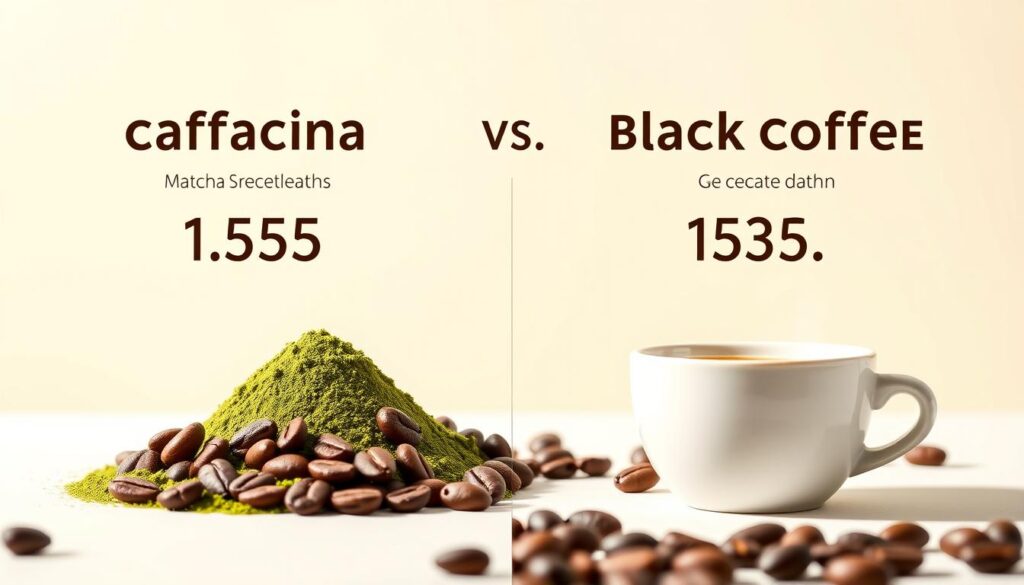
Health Benefits of Matcha
Matcha is a nutritional powerhouse, loaded with antioxidants. These fight oxidative stress and inflammation. Drinking matcha regularly offers many benefits for overall health. Studies link matcha to lower cholesterol levels.
Matcha can also enhance your metabolism, aiding in weight management. It boosts fat burning and increases metabolic rates. Moreover, it contains L-theanine, which relaxes you without making you sleepy. This substance improves focus and helps manage stress, combining productivity with peace.
| Health Benefits | Description |
|---|---|
| Antioxidant-Rich | Contains high levels of antioxidants to fight free radicals. |
| Cholesterol Management | May lower cholesterol levels, enhancing heart health. |
| Weight Management | Supports metabolic rate and fat oxidation. |
| Cognitive Function | Improves focus and relaxation with L-theanine. |
| Stress Reduction | Helps manage stress levels naturally. |
Health Benefits of Coffee
Coffee does more than just wake you up; it’s packed with benefits that boost your health. Drinking it often may cut your risk of getting type 2 diabetes and brain diseases like Alzheimer’s. Scientists say this is because of the antioxidants in coffee, like chlorogenic acids. They fight inflammation.
When it comes to your heart, coffee might help there too. Drinking it in moderation could mean less risk of heart disease. People who drink coffee are often healthier and live longer, thanks to better heart health.
Coffee’s caffeine perks up your brain, improving focus and mood. It makes you more alert and clear-headed. This can help you handle everyday tasks better. Keeping your mind sharp as you get older is another plus.
Comparing Mood Boosts: Matcha vs. Coffee
Matcha and coffee each have their own way of boosting moods. Coffee gives you a quick energy boost. This makes you alert fast. But, it might make some people feel too jittery. This jitteriness can mess with how much you get done. And after the energy spike, you often feel tired once it’s gone.
Matcha, on the other hand, offers a smoother boost. It blends caffeine with L-theanine to make you alert yet calm. This mix helps you stay on track and chill at the same time. Plus, matcha keeps you going longer without a crash. This means less chance of feeling anxious.
Each drink affects your mood and how you do things each day. Knowing how to use them makes their benefits even better. So, here’s a quick comparison of what they do:
| Aspect | Matcha | Coffee |
|---|---|---|
| Mood Enhancement | Promotes calm alertness | Leads to energy spikes |
| Duration of Effect | Long-lasting, steady | Quick but fluctuates |
| Side Effects | Minimal anxiety | Possible jitters |
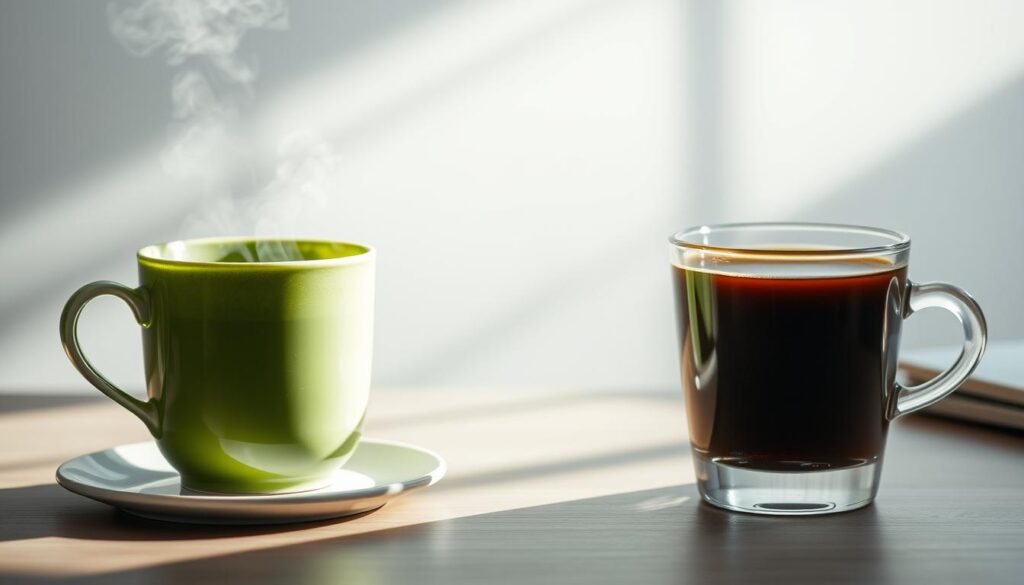
Preparation Methods: How to Make Each Drink
The unique features of making matcha and coffee bring out their best flavors and health perks. Knowing how to make them right can make your drinks taste better.
Making matcha needs some key tools like a bamboo whisk, a bowl, and matcha powder. First, put 1-2 grams of matcha in the bowl. Then, heat water to about 175°F and add 2-3 ounces to the bowl. Whisk it fast in a zigzag until it’s frothy. This way, matcha keeps its bright taste and health benefits.
Brewing coffee comes in different styles, each with its unique taste. You can make it by drip brewing, using a French press, or making espresso. For drip, use 1-2 tablespoons of medium-ground coffee per 6 ounces of water. Pour hot water over the coffee and let it brew for 4 to 6 minutes. The French press gives a richer flavor. Let the coffee sit in hot water for 4 minutes, then push down the plunger. For espresso, use fine coffee grounds and brew under high pressure for about 25-30 seconds.
How you prepare these drinks can change how they taste. Below is a table comparing how to make matcha and coffee:
| Drink | Preparation Method | Tools Needed | Brewing Time |
|---|---|---|---|
| Matcha | Whisk with hot water | Bamboo whisk, bowl | 2-3 minutes |
| Coffee | Drip brewing or French press | Coffee maker or French press | 4-6 minutes (drip), 4 minutes (French press) |
Learning these techniques can boost your enjoyment of matcha and coffee. They help you savor the best taste and health benefits each drink offers.
Taste Profiles: What to Expect
Matcha and coffee taste very different. Matcha is rich and earthy with a hint of bitterness. This special flavor comes from how matcha is grown and made. Every sip lets you taste its deep flavors. Coffee, however, can taste like nuts or fruit. This depends on the coffee bean and how it’s roasted.
Let’s dive deeper into their taste profiles:
| Beverage | Taste Profile | Notes |
|---|---|---|
| Matcha | Rich and Earthy | Subtle bitterness with umami notes; vegetal undertones. |
| Coffee | Nuts to Fruits | Range varies; can include chocolate, berry, or floral notes depending on the bean. |
Comparing these flavors helps you know what to expect. Whether you love the calm ritual of matcha or the energizing boost of coffee, exploring their tastes guides your choice.
Environmental Impact: Sustainability of Matcha and Coffee
When picking your drinks, it’s good to think about how eco-friendly matcha and coffee are. Coffee farms often cut down a lot of trees and use lots of water. This hurts the local environment and animal homes.
On the other hand, matcha is usually grown in ways that are good for the planet. Farmers use techniques that help the soil and save water. Matcha farming also supports different kinds of plants and animals because it’s grown in the shade.
| Beverage | Environmental Impact | Sustainability Practices |
|---|---|---|
| Coffee | Deforestation, high water usage | Conventional farming, often unsustainable |
| Matcha | Less deforestation, lower water usage | Eco-friendly methods, shade-grown |
Choosing between matcha and coffee shows how much you care about the planet. Knowing how each affects the environment helps you pick a drink that matches your green values.
Conclusion: Choosing Between Matcha and Coffee
The matcha vs coffee debate highlights their unique benefits. Matcha gives a steady energy lift and more antioxidants. But if you need quick energy and love a bold taste, coffee might be better for you.
When deciding between matcha and coffee, think about your daily habits. Both can be good for you, but the choice should match your health goals and preferences. Adding either to your diet can boost your wellness.
Choosing matcha or coffee doesn’t have to be an either/or decision. Mixing both into your life lets you enjoy different tastes and benefits. Reflect on what you need and find joy in trying out both to see which one you like more!

